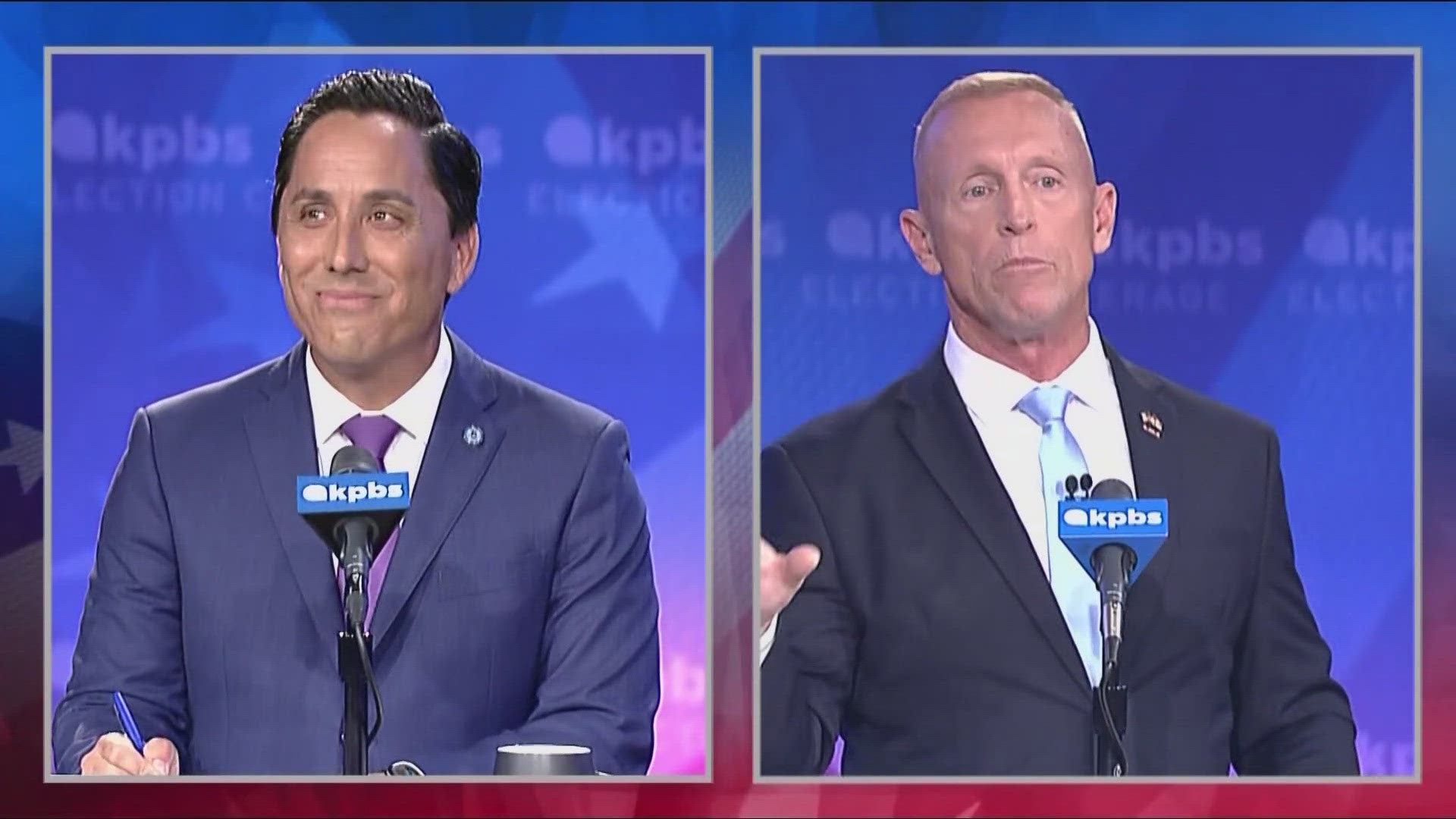SAN DIEGO — On November 5, 2024, San Diegans will head to the polls to decide whether to re-elect Mayor Todd Gloria or to elect his opponent, police officer Larry Turner to serve as San Diego's mayor for the next four years.
Ahead of the election, CBS 8's Carlo Cecchetto sat down with the candidates and asked them to detail their vision for San Diego, focusing on the city's three main challenges facing residents; housing affordability, homelessness, and San Diego's push for a new infrastructure tax to address the city's backlog.
Below are excerpts from each candidate's response. Click on the videos below to see each interview in its entirety.
Housing Affordability
The Question:
What can you do as mayor? What will you do as mayor to bring the cost down for people who want to rent or buy a home in San Diego?
The Answers:
Mayor Todd Gloria emphasized the importance of increasing housing supply to address San Diego's affordability crisis. He highlighted his administration's efforts to streamline the permitting process and encourage housing production.
"What we used to permit in months or years is now being done in 30 days or less," Gloria stated. "In 2022 the city permitted about 5,000 new homes. Last year we did nearly 10,000 new homes."
The mayor acknowledged concerns about increased density in single-family neighborhoods. He said that the consequences of inaction would be worse, and could force young families out of San Diego or add to the city's current homelessness crisis.
Whereas, Larry Turner emphasized the importance of preserving existing affordable housing and discouraging outside investors from artificially inflating housing costs. He criticized Mayor Gloria's approach, stating, "We knocked down so much affordable housing with the idea of, if we keep building, we're going to lower housing costs. And in reality, you know, we're filling our landfills with affordable homes that we're just destroying."
Turner proposes putting an end to adding affordable housing developments in areas with a high concentration of such units. Turner also says he would assist landlords in maintaining and improving current rent-restricted units, as well as no longer allowing developers to pay fees to get out of building affordable units. Turner also said he would discourage short-term vacation rentals.
Infrastructure Funding
The Question:
The City of San Diego is $9.3 billion short in needed infrastructure improvements. To address the backlog, the city is asking voters to approve Measure E, a one-cent sales tax on residents. Why? Why is this a necessary measure?
The Answers:
Gloria supports Measure E as a way to generate funds for infrastructure improvements. He cited the $9.3 billion infrastructure deficit and the need for significant investment in roads, dams, and storm channels.
"A penny is a small investment that will save consumers, I think, more in the long run, and has a happy benefit of improving our quality of life, protecting our environment and growing our economy," Gloria explained.
The mayor addressed concerns about the measure's wording, which directs funds to the general fund rather than specifically earmarking them for infrastructure. He emphasized that this approach allows for a simpler majority vote and assured voters that infrastructure would remain a top priority.
On the other hand, Larry Turner says residents should not have to shoulder the blame for the city's poor financial decision making.
Regarding the proposed one-cent sales tax increase, Turner argued that the current administration has not been responsible with existing funds and that the tax would disproportionately affect lower-income residents.
"They haven't been responsible with the money they've been spending already. Mayor Gloria got us in a deficit. We have some really good finance principles that we're supposed to follow in San Diego, and we did up until about four years ago."
Instead of taxing residents, Turner says the city needs to focus on ways to spend existing funds more wisely as well as make the city more business-friendly in hopes of boosting revenue.
Homelessness
Homelessness remains one of San Diego's top issues, with the number of newly homeless outpacing the number of those who are placed into housing.
CBS 8 asked each mayoral candidate for their ideas on how they plan to address the ongoing crisis.
The Question:
What do you say is the driving cause in San Diego for homelessness and how would you address it?
The Answers:
Mayor Gloria identified the high cost of housing as the primary driver of homelessness in San Diego while acknowledging the complexity of the issue. He defended the city's use of temporary shelters as a necessary immediate solution.
"Encampments are unsafe, both for the unhoused individual and for the broader community," Gloria stated. "What we found with our safe sleeping sites is they are extremely popular. About 80% of the folks who are in those facilities tonight have never previously touched our shelter system."
The mayor also addressed concerns about the proposed 1,000-bed shelter on Kettner Boulevard, emphasizing that negotiations are ongoing and that the city is committed to finding a solution that works for both the homeless population and the surrounding community.
Gloria's opponent, Larry Turner identified mental health issues and chemical addiction as the primary drivers of homelessness in San Diego. He emphasized the need for a more proactive approach.
"Compassion requires action, and I'm an action person on this, I can have a dialog with people who disagree with me on this, but I'm not going to let them stay on our streets and die anymore."
Turner says he would do this by implementing conservatorships for those unable to make decisions due to mental health or addiction issues, providing better quality shelters with wraparound services and by partnering with the philanthropic community to fund innovative solutions.
Below are the entire interviews with each candidate.

